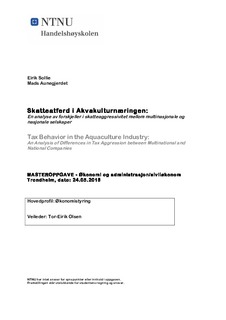| dc.contributor.advisor | Olsen, Tor-Eirik | |
| dc.contributor.author | Sollie, Eirik | |
| dc.contributor.author | Aunegjerdet, Mads | |
| dc.date.accessioned | 2018-12-14T13:41:12Z | |
| dc.date.available | 2018-12-14T13:41:12Z | |
| dc.date.issued | 2018 | |
| dc.identifier.uri | http://hdl.handle.net/11250/2577783 | |
| dc.description.abstract | Temaet for studien er skatteaggressivitet i akvakulturnæringen, hvor fokuset ligger på forskjellen i skatteaggressivitet mellom multinasjonale og nasjonale selskaper. Norge har de senere år satt ned selskapsskattesatsen som et tiltak for å redusere incentivet multinasjonale selskaper har til å flytte overskudd ut av Norge (Meld. St. 4 (2015-2016)). Det har vært relativt få forskningsartikler som har studert multinasjonale selskapers skatteaggressivitet i Norge, men samtlige studier vi har kjennskap til indikerer at multinasjonale selskaper er mer skatteaggressive enn nasjonale selskaper. Kunnskap om multinasjonale selskapers skatteaggressivitet i akvakulturnæringen, vil kunne være av interesse for politiske aktører i utformingen av regler for beskatning av slike selskaper, som skattemyndigheter og andre berørte interessenter. Med bakgrunn i dette har vi formulert følgende problemstilling:
”Er det forskjeller i skatteaggressivitet mellom multinasjonale og nasjonale selskaper i akvakulturnæringen?”
Selv om hovedfokuset ligger på skatteaggressivitet (forskjeller mellom MNS og nasjonale selskaper), så har vi også utviklet hypoteser som omhandler andre potensielt interessante sammenhenger for selskapers skatteaggressivitet. Vi utviklet derfor totalt fire hypoteser med utgangspunkt i agentteori og relevant forskning. Hypotesene testet vi ved hjelp av en lineær multippel regresjon. Studiens data er basert på informasjon fra Bisnode og selskapenes årsrapporter for perioden 2012-2016. Vårt mest sentrale funn indikerer at multinasjonale selskaper har en høyere grad av skatteaggressivitet enn nasjonale selskaper i akvakulturnæringen. Ved å inkludere en ekstra variabel for multinasjonale selskaper viser vårt funn at å måle multinasjonale selskapers skatteaggressivitet er preget av komplekse sammenhenger. Videre ble det funnet en signifikant sammenheng mellom økt skatteaggressivitet og selskapenes eierkonsentrasjon.
Studien gir et bidrag til debatten rundt multinasjonale selskapers skatteaggressivitet. Skatteinntekter og beskyttelse av skattefundamenter er viktig for finansieringen av velferdsstaten. Det er også viktig med likebehandling av multinasjonale og nasjonale selskaper. Av den grunn vil norske myndighetsorgan kunne ha stor nytte av en slik studie. Studien viser også at det mer komplekst å måle multinasjonale selskapers skatteaggressivitet enn hva tidligere studier har gitt uttrykk for, og dette bør undersøkes nærmere i videre forskning. | nb_NO |
| dc.description.abstract | -
The topic for this thesis is tax in the aquaculture industry. The main focus is on the differences in tax aggression of national and multinational companies. Over the past years Norway has lowered the corporate tax rate to reduce multinational companies’ incentives to move profits out of the country (Meld. St. 4 (2015-2016)). There have been relatively few studies on multinational companies' tax aggressiveness in Norway, but the common denominator to them all is that multinational companies are more tax aggressive than national companies. Knowledge of multinational corporations' tax aggressiveness in the aquaculture industry could be of interest to political actors and tax authorities in designing rules for taxation, as well as for other stakeholders. Based on this, we have formulated the following thesis question:
"Are there differences in tax aggression between multinational and national companies in the aquaculture industry?"
Although the main focus is on tax aggression (differences between MNS and national companies), four additional hypotheses, that deal with other potentially interesting relationships for companies' tax aggression, were developed based on agent theory and relevant research. The hypotheses were tested using a linear multiple regression. The data is based on information from Bisnode and the companies' annual reports during the period from 2012 to 2016. Our key findings indicate that multinational companies are more tax-aggressive than national companies in the aquaculture industry. By including an additional variable for multinational corporations, our finding shows that measuring multinational corporations' tax aggression is characterized by complex relationships. However, a significant correlation was found between increased tax aggression and the companies' ownership concentration.
This study contribute to the discussion on multinational companies' tax aggression. Tax income and protection of tax law are important for maintaining the welfare state. Equal treatment of national and multinational companies is also important. Because of the abovementioned reasons the Norwegian Government should find this study useful. This study also shows that multinational corporations' tax aggression is more complex to measure than assumed in previous studies. Thus, future research should focus on this. | nb_NO |
| dc.language.iso | nob | nb_NO |
| dc.publisher | NTNU | nb_NO |
| dc.title | Skatteatferd i Akvakulturnæringen: En analyse av forskjeller i skatteaggressivitet mellom multinasjonale og nasjonale selskaper | nb_NO |
| dc.type | Master thesis | nb_NO |
| dc.subject.nsi | VDP::Samfunnsvitenskap: 200::Økonomi: 210 | nb_NO |
